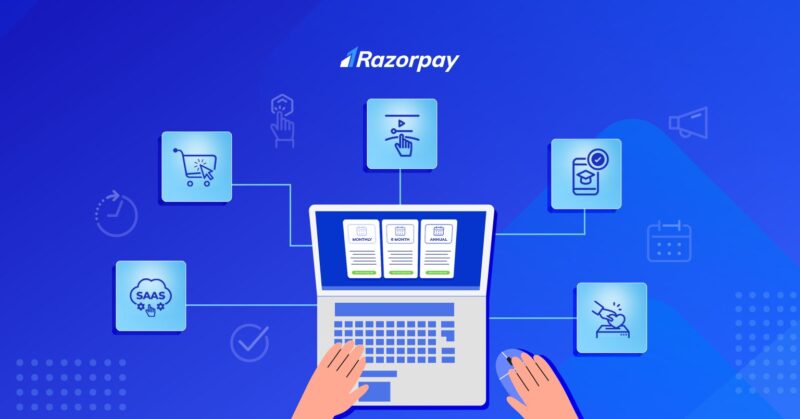In the current digital era, online payments have become an essential part of daily life, with the rise of e-commerce and various online businesses creating a growing need for reliable and secure payment gateways. One company that has gained significant popularity in this domain is Razorpay. Founded in 2014 by IIT Roorkee alumni Harshil Mathur and Shashank Kumar, Razorpay has rapidly emerged as one of India’s leading payment gateways, offering a range of financial services to businesses. The Razorpay Business Model is particularly noteworthy for its ability to cater to businesses of all sizes while generating revenue through various channels.
Understanding Razorpay
Razorpay is designed to help businesses accept payments from customers through a wide array of payment options, including credit and debit cards, UPI, net banking, and other popular payment methods in India. Since its inception, the company has earned the trust of thousands of businesses across different industries by providing a user-friendly and secure platform to process online payments. Razorpay’s advanced technology, combined with its exceptional customer service, has made it a key player in the payment gateway industry. Its business model has empowered small, medium, and large enterprises to streamline their payment processes and drive growth.
Razorpay Company Details
| Company Name | Razorpay |
| Origin Country | India |
| Founded | 2013 |
| Founders | Harshil Mathur, Shashank Kumar |
| CEO | Harshil Mathur |
| Headquarters | Bangalore, Karnataka, India |
| Industry | Fintech, Payment Processing |
| Key Offerings | Payment Gateway, Payment Processing Solutions |
| Number of Employees | Over 1,500 (as of last update) |
| Official Website | www.razorpay.com |
Razorpay Business Model Explained
The Razorpay Business Model revolves around earning revenue through transaction fees and the provision of online payment gateway services. Businesses can choose between two main pricing plans: the Standard Plan and the Enterprise Plan.
- Standard Plan: This plan does not come with any annual maintenance fees but charges a transaction fee of 2-3% for every payment processed through Razorpay’s platform. This plan is ideal for small to medium-sized businesses and startups looking for a cost-effective payment gateway solution.
- Enterprise Plan: Tailored to meet the needs of large enterprises, this plan offers customized solutions for big businesses such as BYJU’S, Airtel, and others. It is priced differently, with larger organizations typically opting for this plan due to the higher volume of transactions and specialized services.
Besides transaction fees, Razorpay also generates revenue from its financial products, such as RazorpayX, which provides businesses with advanced financial management tools like current accounts, corporate credit cards, and more. This multi-faceted business approach allows Razorpay to serve a wide spectrum of companies, from startups to large corporations.
Revenue Sources – How Razorpay Makes Money
The Razorpay Business Model is centered on generating income through various streams, primarily by offering payment and financial solutions to businesses. Its key sources of revenue include:
- Transaction Fees: Razorpay’s primary source of income is the transaction fees charged for every payment processed through its platform. These fees vary depending on the type of payment method used and the volume of transactions a business handles.
- Subscription Fees: Razorpay provides businesses with a variety of payment services, including payment links, subscription models, and gateways. Companies must pay subscription fees to use these services, and the fee structure depends on the billing cycles chosen by the businesses—be it daily, monthly, or yearly. Razorpay’s subscription services are supported by popular plugins like WooCommerce, OpenCart, and Magento, making it easy for businesses to integrate with their platforms.
- RazorpayX Payroll: This relatively new feature has become a significant source of revenue for Razorpay. RazorpayX Payroll automates the calculation and disbursement of employee salaries. It offers three plans: the Free Plan, Payroll Plan, and Pro Plan, with the latter charging INR 100 per employee per month. The Pro Plan is the most recommended, while other payroll services may charge up to INR 1500 per month.
- API Access Fees: Razorpay allows businesses to integrate its payment gateway with their websites or mobile apps through Application Programming Interfaces (APIs). Businesses must pay a fee to access these APIs, which includes a 2% platform fee for accepting payments, along with an 18% GST charge.
- Payment Gateway Reselling: Another source of revenue comes from Razorpay’s payment gateway reselling services. Businesses can resell Razorpay’s gateway to their clients, and Razorpay charges a fee for this service.
Conclusion
Razorpay has successfully established itself as a trusted provider of integrated payment solutions in India. The Razorpay Business Model is focused on offering businesses secure, reliable, and seamless payment gateway services. By generating revenue from transaction fees, financial products, subscription services, and other channels, Razorpay has created a sustainable and scalable business that supports enterprises of all sizes. Through its innovative approach, Razorpay continues to drive the growth of digital payments in India.
















